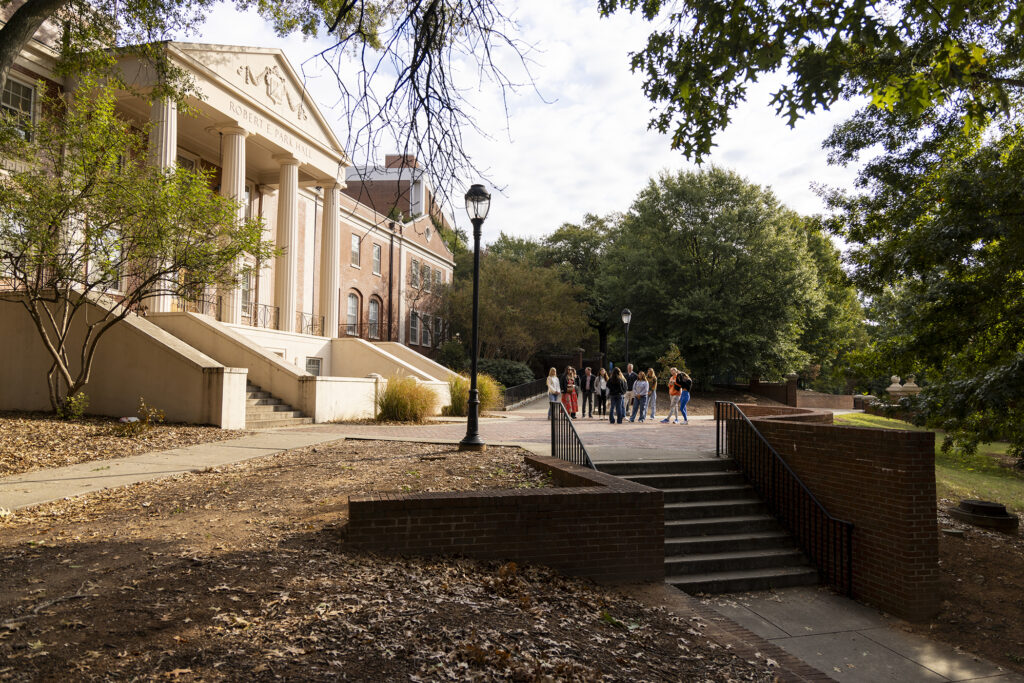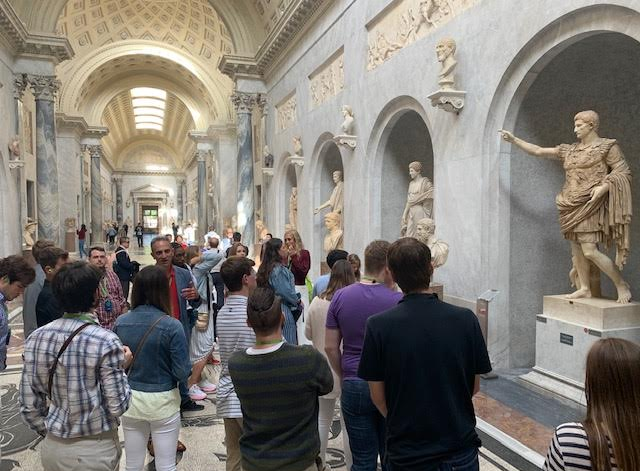The study of classical languages at the University of Georgia dates to the university’s founding, when Latin and Greek were required for admission. In the wake of industrialization and the two world wars, higher education in the United States shifted its focus to modern languages.
However, the Franklin College of Arts and Sciences Classics department at UGA continued to thrive.
In the most recent report by the Modern Language Association, UGA was listed as having the largest Latin program in the nation.
The MLA report is the longest-running comprehensive analysis of the study of world languages at U.S. colleges and universities. It includes undergraduate and graduate course enrollments in languages other than English in fall 2021 for 2,455 degree-granting colleges and universities in the United States, or 92.2% of all eligible institutions.

Park Hall houses UGA’s Department of Classics. (Photo by Chamberlain Smith/UGA)
The UGA Latin program has been marked by longevity and commitment from faculty and administrators, and it continues to innovate and attract a broad range of students.
Under the leadership of James W. Alexander from 1948 to 1980, UGA was among the pioneering Classics programs in the U.S. to introduce Classics-in-Translation courses. This innovation enabled a wider student audience to immerse themselves in classical culture and literature without the necessity of studying Greek or Latin and served as an inspiration for more students to explore the classical languages.
A fervent advocate for reaching out to middle and high school Latin teachers statewide, Alexander fostered a collaborative effort that attracted numerous talented students to UGA. The establishment of the study abroad program in Rome in the 1970s further enhanced the department’s academic offerings.
Following Alexander, Richard A. LaFleur, the program’s head from 1980 to 2001, built on the foundations laid by his predecessor. LaFleur’s leadership saw the establishment of the Georgia Classical Association and its publication, the GCA newsletter, enhancing collaboration between schools and colleges. The faculty expanded, offering minors as well as majors in Latin, Greek and Classical culture. The graduate program flourished, attracting students from across the U.S., including the creation of the Georgia Classics Summer Institute.
“I started studying Latin at the age of 11 and have never stopped. Even now, at the age of 78, I continue to offer instruction to students across the U.S. and overseas through my online tutorials,” said LaFleur. “Teaching for four decades at UGA was a joy, and I had the privilege of working with motivated students, creative faculty and highly supportive deans in Franklin College. Together, we built our Latin program into what has been, for many years, the largest among all colleges and universities in the country.”
In the late ’70s and ’80s, LaFleur’s contributions extended beyond UGA as he chaired the Classical Association of the Middle West and South Committee for the Promotion of Latin and served as president of the American Classical League. His efforts, including designing the NEH-funded National Latin Institute, elevated the department’s status as a leading center for Latin study and teacher preparation.
UGA’s Latin enrollments became the largest among all U.S. colleges and universities during this period. Under the current head, Mario Erasmo, the department continues to diversify and expand Latin and Classics offerings, maintaining its status as the country’s largest Latin program.
Current initiatives further place UGA Classics among the most innovative and thriving programs in the country. The department leads all Classics programs nationally with three faculty-led study abroad programs that take over 60 students to Europe each summer, including UGA in Rome, one of the two founding study abroad programs at UGA in 1970.
“The faculty are focused on student success, in keeping with the department’s motto, ‘Preparing you for what comes next,’” said Erasmo.
Prior MLA reports also highlighted UGA’s success in Latin enrollments. The Enrollments Report for 2016 lauded the department’s effective approach, rooted in teacher training and mentoring. Graduate students in the two-year M.A. program in Latin undergo rigorous training, including leading their own elementary Latin classes. This commitment to teacher training, coupled with collaboration with K–12 Latin programs, positions UGA’s Classics department as a national leader in Latin education, according to the 2016 report.
As UGA’s Classics department continues to evolve and thrive, its legacy as a beacon of classical education remains firmly intact.
As Erasmo closes each Classics newsletter, “Three centuries of focusing on student success, and counting.”








